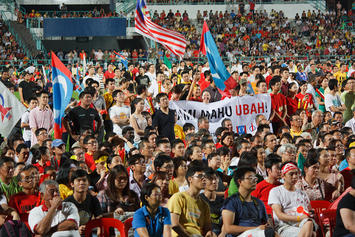
The recent general election in Malaysia left behind a bitter legacy of political divisions, threats of lawsuits, growing demonstrations, and arrests under the Sedition Act. In a larger sense, however, it was another sign that the race-based political order in Malaysia, and to a certain extent in neighboring Singapore, is breaking down.
Ever since Malaysia won independence in 1957 it has been governed by a coalition – the National Front or Barisan Nasional (BN) - made up of as many as a dozen parties, representing the ethnic and racial makeup of this multicultural country.
The quintessential representative of the old order was Mahathir Mohamad, who served 22 years (1981 to 2003) as prime minister. He spoke in Tokyo shortly after the May 5th general election and defended the coalition system as a means of apportioning the power and wealth of the country among its diverse groups.
After each general election the Barisan distributed cabinet posts to the leaders of the various partners, assuring that some posts went to ethnic Chinese, to ethnic Indians, and to representatives of aboriginal and indigenous peoples in the states of Sabah and Sarawak on the island of Borneo.
Mostly, these were second and third-tier portfolios. The plum jobs, such as defense, foreign affairs, finance, and of course the prime minister’s post itself went to the United Malays National Organization (UMNO) that represented, in this racial scheme, the Malays, who make up about 60 percent of the population.
This year, for the first time, no ethnic Chinese will be serving in the cabinet. Chinese voters deserted the main Chinese coalition parties in droves to vote for an opposition coalition under the leadership of Anwar Ibrahim, leaving hardly anyone available to take up the jobs. Prime Minister Najib Razak called it a “Chinese tsunami”.
Increasingly, the BN is dependent on East Malaysian parties to maintain a majority. The 47 seats that the Barisan won in Sabah and Sarawak saved Najib’s bacon last month. Without them, he might have fallen short of the majority needed to form a government under Malaysia’s Westminster style of government.
But it is an unstable base, as it depends on continued malapportionment. For example, the capital, Kuala Lumpur, with a population of 7 million has 11 seats, while Sabah, with 3.5 million people sends 25 members to parliament. That kind of imbalance cannot persist in a democratic country, especially as more young people drawn to the under-represented areas see themselves left out.
In his recent talk, Mahathir lamented that Malaysia is still a divided country, without seeming to acknowledge that the system of race-based politics might itself have contributed to the divisions. The Chinese, who make up a quarter of the population, refuse to assimilate, unlike ethnic Chinese in Indonesia or Thailand, he said.
He might have noted that for years, the Suharto regime in Indonesia suppressed outward manifestations of ethnicity, to the point of banning celebrations of Chinese New year, Chinese language schools even the use of the Chinese script. These restrictions were lifted only with the end of the New Order regime in 1998.
In neighboring Singapore, the old order, built around a monopoly of power for the governing Peoples’ Action Party, is slowly crumbling, too. In the 2011 general election the PAP garnered about 60 percent of the vote, better perhaps than the Barisan’s 47 percent this year, but still the lowest percentage since independence.
For the first time, the opposition captured a Group Representative Constituency, a unique Singaporean form of electoral machinery whereby five candidates run as a slate. The system was ostensibly designed to ensure racial balance, since at least one member had to come from a Malay, Indian or other minority community.
That is the rationale, anyway. Many believe it was meant to disable the opposition by making it harder to recruit enough candidates and pay the costs of running, while at the same time providing electoral refuge for weaker PAP candidates who might lose in face-to-face encounters.
Overnight, the opposition tripled its numbers in parliament. Capturing the Aljuniad GRC was like climbing Mount Everest. It will be easier next time. The opposition in Singapore, such as it was, once was made up of gadflies and loners. But a new breed of highly educated Singaporeans is aspiring to lead, exemplified by the new opposition MP Chen Shaw Mao, a former Rhodes Scholar.
Malaysia’s prime minister returns to office considerably weakened. His coalition performed even worse than it did in 2008 under his predecessor, Abdullah Badawi, who resigned, taking the blame for the poor showing. Najib faces threat of coalition defections and the possibility, though remote, that some of his members may be disqualified through successful challenges based on voter fraud.
He is fighting back, in part by wielding the Sedition Act against demonstrators, and by packing the cabinet with Malay nationalists. Najib has to stand for re-election as leader of UMNO at a party conference later this month, where he may be challenged by his deputy, Muhyidden Yassin.
Mahathir predicted that, in the end, the party and the coalition will come around to supporting Najib because “there is no alternative.” That maybe more true today than it will be tomorrow.
Todd Crowell is a Tokyo-based journalist. He has covered Malaysian politics for Asiaweek magazine.
Flickr photo by Hitoribocchi; Pakatan Rakyat Rally, general elections, Malaysia, May, 2013.












